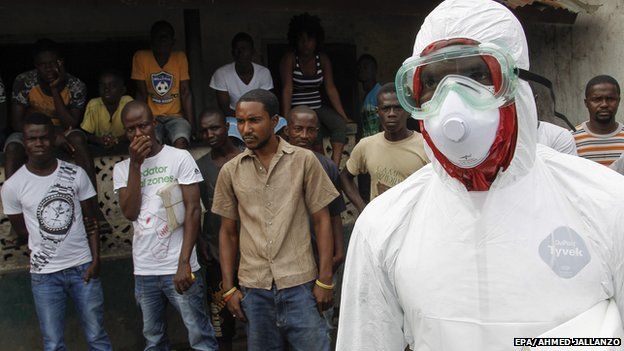Ebola crisis: UK aid cuts 'hit fight' against virus
- Published

Cuts in the amount of health aid the UK provides to Liberia and Sierra Leone have "compromised the fight" to stop the spread of the Ebola virus, MPs say.
More than 3,000 people are suspected to have died in the current epidemic.
The Commons' International Development Committee report comes as experts and politicians meet in London to debate a global response to the crisis.
The UK government said it had made "a £125m pledge to contain, control and defeat this disease".
Two of the countries worst affected by the crisis are Sierra Leone and Liberia.
The committee claims that government aid cuts made before the Ebola outbreak began may have made the situation worse.
Its report says aid was cut to the two countries by nearly a fifth and this funding should now be reinstated.
The committee's chair, Liberal Democrat deputy leader Sir Malcolm Bruce, said: "The scale of the Ebola crisis now unfolding in Sierra Leone and Liberia may well be connected to declining levels of international support for health system improvements in what remain two of the poorest and least developed countries in the world.
"In the midst of this devastating epidemic, it is wrong for the UK to cut its support to these two countries. The planned termination of further UK funding to the Liberian health sector is especially unwise."
Sir Malcolm said the UK could be proud of the work done by the Department of International Development (DfID) in the region, and highlighted the extra support DfID had provided to help deal with Ebola since the report had been drawn up.
But he added: "Ministers must take a closer interest in where UK money is going and whether it is being spent as intended. DfID did not seem to be concerned about how much of the work they recently funded has been undone through a failure to distribute ongoing support."
DfID said in a statement: "This report is out of date.
"Britain remains the largest bilateral donor to Sierra Leone and we are leading the international response to this unprecedented outbreak through a £125m pledge to contain, control and defeat this disease."
Analysis - Mark Doyle, BBC International Development Correspondent
The Ebola epidemic is devastating three west African countries - Sierra Leone, Liberia and Guinea. These very poor countries had very few clinics and hospitals even before Ebola hit.
Now almost every available hospital bed is taken by patients with Ebola. So people with other medical needs, from childbirth to malaria, are suffering too. Britain has promised to build facilities for seven hundred new beds in Sierra Leone.
But everyone accepts this is not enough. Hence today's international meeting in London where Britain and Sierra Leone hope new money will be promised.
According to the latest figures released by the World Health Organization, there have been 7,178 reported cases of Ebola, most of them in Liberia, Sierra Leone and Guinea. So far, 3,338 people are suspected to have died from the virus.
The epidemic has spread to five African countries. Earlier this week, the US recorded its first Ebola diagnosis, though the patient is thought to have contracted the virus in Liberia.
'Greater awareness'
The Ebola Donors Conference in London on Thursday is being hosted by the UK and Sierra Leone governments. Its main agenda is to discuss what the global community can do to provide an effective international response to the epidemic.
It will be chaired by Foreign Secretary Philip Hammond, who said he hoped it would "raise even greater awareness of the disease and what is needed to contain it , encourage ambitious pledges and show our solidarity with Sierra Leone and the region."
The President of Sierra Leone, Ernest Bai Koroma, will be unable to attend as the British charter plane sent to the capital Freetown to collect him developed a technical fault. It is hoped he will join the conference by video-link.